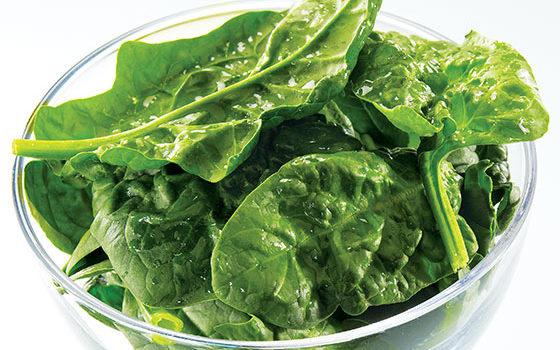A variety of sources!
Foods containing folic acid can be found in three of the four food groups in Canada’s Food Guide.
| GROUPS |
FOOD SOURCES |
| VEGETABLES AND FRUIT |
Mainly leafy green vegetables (e.g. asparagus, broccoli and spinach) and some fruits, such as oranges, raspberries and honeydew melons. |
| MEAT AND ALTERNATIVES |
Organ meats, nuts, seeds, legumes (white beans, chickpeas, lentils) |
| GRAIN PRODUCTS |
Whole and enriched grain products
(bread, cereal, pasta) |
The benefits of folic acid
In addition to helping to regulate our moods, folic acid plays several key roles in the body.
Folic acid:
- promotes the proper functioning of the nervous system
- improves wound healing
- supports a healthy immune system
Folic acid and pregnancy
Folic acid is extremely important for pregnant women! A folate deficiency can cause damage to the fetus’s developing nervous system.
Cooking tip
Folic acid is heat sensitive. Ideally, vegetables should be quickly steamed or cooked with very little water.
Natural or synthetic?
Folate and folic acid are the two forms of vitamin B
9. Folic acid is the synthetic form found in vitamin supplements and fortified foods (such as pasta), while folate is the natural form found in foods.
How much do you need?
An adult should consume about 400 mcg of folate daily. The recommended intake for pregnant women is 600 mcg, and 500 mcg for women who are nursing.
Here are some references with additional information:
| FOOD NAME |
MEASURE |
FOLATE CONTENT |
| Veal liver, pan-fried |
100 g |
350 mcg |
| Cooked legumes |
250 mL (1 cup) |
150–379 mcg |
| Asparagus or spinach, boiled |
125 mL (½ cup) |
140 mcg |
| Enriched pasta, cooked |
250 mL (1 cup) |
114 mcg |
| Broccoli, boiled |
125 mL (½ cup) |
89 mcg |
| Spinach, raw |
250 mL (1 cup) |
61 mcg |
| Nuts, hazelnuts or filberts, dried with skins on |
60 mL (¼ cup) |
39 mcg |
| Orange juice |
125 mL (½ cup) |
24–58 mcg |
| Breakfast cereal (fortified) |
250 mL (1 cup) |
21–62 mcg |
| Ground flaxseed |
15 mL (1 tbsp.) |
20 mcg |
Source: Health Canada, Canadian Nutrient File, version 2007b.
Most pregnant women do not get enough folate through their diet alone. For this reason, they should take a daily multivitamin containing 400 mcg of folic acid, in addition to their dietary folate intake, to protect the fetus against neural tube defects.
Ways to improve your folate intake!
Here are some links to delicious recipes to help you fill up on this vitamin!
- When asparagus becomes wrapped in flavour: Spiced Gouda & Asparagus Gratin
- When chickpeas start with a crunch and then melt in your mouth: Curry Chickpea Nuggets with Yogurt Sauce
- When spinach and lentils come together in a fresh way: Spinach & Lentil Salad
- When tender, crispy and crunchy all come together in one bite: Pasta Salad with Veggies & Nuts

